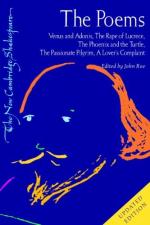|
This section contains 5,667 words (approx. 19 pages at 300 words per page) |

|
SOURCE: “The Phoenix and the Turtle,” in On the Literary Genetics of Shakespere's Poems & Sonnets, University of Illinois Press, 1950, pp. 363-77.
In the following essay, Baldwin examines the various sources that Shakespeare drew from in his The Phoenix and Turtle.
In The Phoenix and the Turtle, Shakspere has taken his pattern from Ovid, Amores II, 6, some material eventually from Lactantius, and has put the whole into the setting of a contemporary funeral.1 We know, of course, of Lesbia's sparrow. But Dominicus assures us,
Psitaci, quem sibi ab orientalibus oris missum, puellae suae donarat Ouidius, interitum deflet: quemadmodum et Catullus Lesbiae suae passerem mortuum deplorauit. Est autē haec dubio procul elegia pulcherrima, et in qua plures poeticae artis uirtutes enitent.2
So Shakspere takes this “most beautiful” of all bird elegies as his model. Ovid begins
Psittacus, Eois imitatrix ales ab Indis, occidit—exequias ite frequenter, aves! ite, piae volucres...
|
This section contains 5,667 words (approx. 19 pages at 300 words per page) |

|


